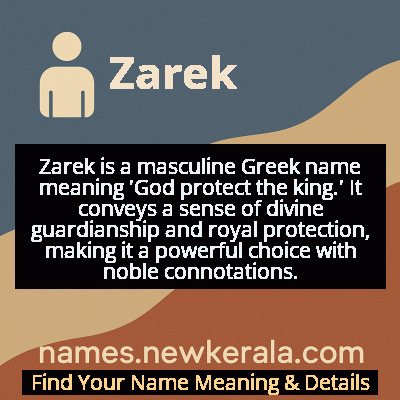Zarek Name Meaning & Details
Origin, Popularity, Numerology Analysis & Name Meaning of Zarek
Discover the origin, meaning, and cultural significance of the name ZAREK. Delve into its historical roots and explore the lasting impact it has had on communities and traditions.
Name
Zarek
Gender
Male
Origin
Greek
Lucky Number
7
Meaning of the Name - Zarek
Zarek is a masculine Greek name meaning 'God protect the king.' It conveys a sense of divine guardianship and royal protection, making it a powerful choice with noble connotations.
Zarek - Complete Numerology Analysis
Your Numerology Number
Based on Pythagorean Numerology System
Ruling Planet
Neptune (Ketu)
Positive Nature
Intuitive, analytical, spiritual, and inquisitive.
Negative Traits
Secretive, reserved, aloof, and can be overly critical.
Lucky Colours
Green, yellow.
Lucky Days
Monday.
Lucky Stones
Cat’s eye, moonstone.
Harmony Numbers
1, 5, 6.
Best Suited Professions
Scientists, researchers, spiritual leaders, detectives.
What People Like About You
Depth of knowledge, analytical skills, spirituality.
Famous People Named Zarek
Zarek Valentin
Professional Soccer Player
Puerto Rican international defender who has played for multiple MLS teams including Portland Timbers and Houston Dynamo
Zarek Degen
Academic Researcher
Noted scholar in computational linguistics and artificial intelligence at leading technology institutes
Zarek K. Zaremba
Business Executive
Innovative entrepreneur in sustainable energy technology and green infrastructure development
Name Variations & International Equivalents
Click on blue names to explore their detailed meanings. Gray names with will be available soon.
Cultural & Historical Significance
In modern Greek diaspora communities, Zarek maintains its cultural resonance while adapting to contemporary naming trends, often chosen by parents who wish to honor their heritage while selecting a distinctive, powerful name for their son. The name's evolution reflects the broader story of Greek cultural preservation and adaptation, maintaining traditional meanings while fitting into global naming patterns. Its continued use demonstrates how ancient cultural values can be transmitted through generations while remaining relevant in modern contexts.
Extended Personality Analysis
Individuals named Zarek are typically perceived as natural leaders with a protective instinct and strong sense of responsibility. They often exhibit a blend of traditional values and modern thinking, combining respect for established principles with innovative problem-solving approaches. Zareks are frequently described as confident yet humble, possessing an inner strength that doesn't need constant validation from others. They tend to be strategic thinkers who consider both immediate and long-term consequences of their actions, making them effective in leadership positions.
Their protective nature extends beyond physical safety to emotional and psychological well-being of those they care about, often making them reliable friends and family members. While they can be decisive and firm in their convictions, they typically balance this with empathy and consideration for others' perspectives. This combination of strength and compassion makes Zareks particularly effective in roles requiring both authority and interpersonal sensitivity. They often excel in careers that allow them to protect, guide, or lead others while maintaining their integrity and moral compass.
Modern Usage & Popularity
Zarek has experienced a resurgence in popularity in recent decades, particularly among parents seeking strong, distinctive names with classical roots. While not among the most common names, it has seen steady growth in English-speaking countries and maintains consistent usage in Greek communities worldwide. The name appeals to modern parents who appreciate its powerful meaning, unique sound, and cultural heritage without being overly common. It's particularly popular in urban areas and among families with multicultural backgrounds who value names that work well across different languages and cultures. Social media and global connectivity have contributed to its spread beyond traditional Greek communities, with the name appearing in diverse regions from North America to Australia. Current naming trends favoring distinctive yet meaningful names suggest Zarek will continue to gain popularity while remaining relatively uncommon compared to mainstream choices.
Symbolic & Spiritual Meanings
Symbolically, Zarek represents divine protection, leadership, and the intersection of spiritual and worldly power. The name carries connotations of guardianship and responsibility, suggesting someone who serves as a bridge between higher powers and human affairs. It symbolizes the ideal of righteous leadership—authority tempered by humility and service. In metaphorical terms, Zarek embodies the concept of the 'protector king' archetype, representing both strength and compassion, power and responsibility. The name suggests a person destined to shield others from harm while guiding them toward greater purposes, making it symbolic of benevolent authority and protective influence in various aspects of life. This symbolic richness makes the name particularly meaningful for parents who wish to imbue their child's identity with ideals of protection, leadership, and spiritual connection.

